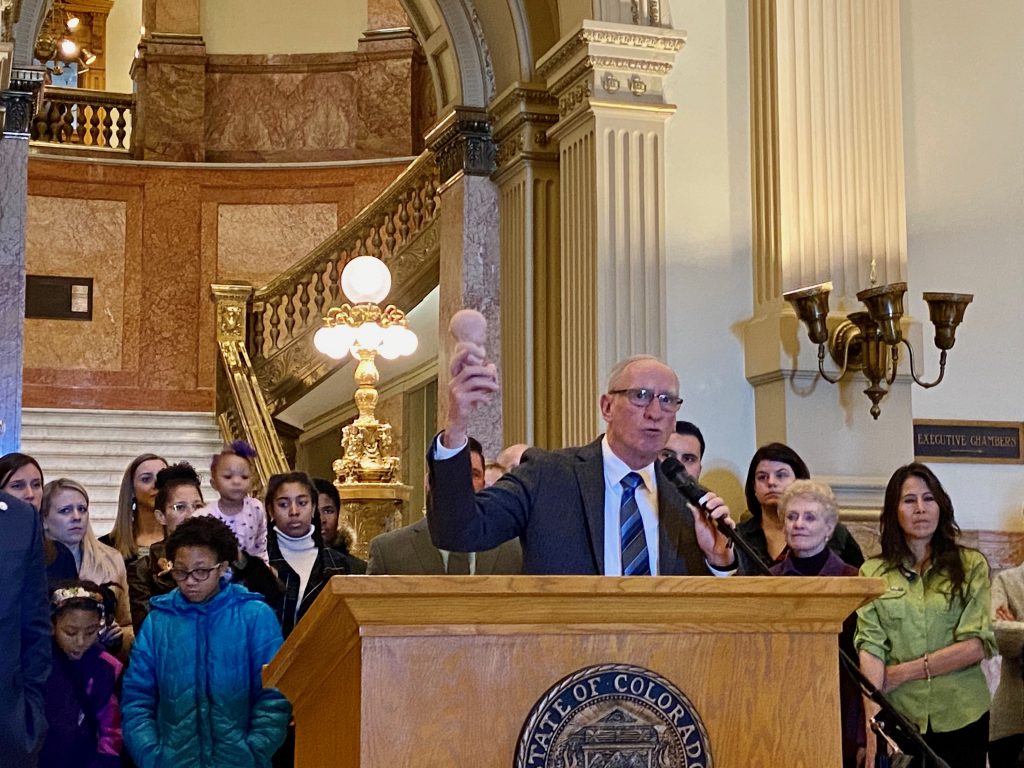If you received a diagnosis of a horrific pregnancy problem, would you want access to an abortion? Or would you want your options to be limited to stillbirth, miscarriage, or a suffering child, who would most likely die within a year?
At a press conference at the Capitol last week, proponents of Proposition 115, a potential 2020 ballot initiative to ban abortion after 22 weeks, argued that women in these circumstances are better off having miscarriages or stillbirths, or delivering a baby that will soon die, than having an abortion late in pregnancy.
“Miscarriage is a natural process that happens,” said Lauren Castillo, a spokesperson for the campaign, called Due Date Too Late. “With perinatal hospice, it’s giving them a healing way to really have that journey of a late-term miscarriage, and that’s what we’re advocating for women who may receive a fatal fetal diagnosis where the baby might not live after the birth.”
The initiative takes aim at the Boulder Abortion Clinic, which specializes in serving patients from all over the world who chose to terminate a pregnancy rather than suffer a miscarriage or stillbirth, or deliver a child that would have a low quality of life due to fetal anomalies that often aren’t detected until late into a pregnancy.
Perinatal hospice has become a common messaging tool used by abortion opponents as an answer to what women should do in the event that a wanted pregnancy goes awry.
Several states, including Oklahoma, Mississippi, and Kansas, have laws mandating that doctors provide women with information about perinatal hospice if they’re considering abortion after receiving a lethal fetal diagnosis. Such a law was implemented in Indiana in 2016 under the leadership of then-Gov. Mike Pence, who called it “a comprehensive pro-life measure that affirms the value of all human life.”
Pressed by another reporter on whether Proposition 115 would provide funding for perinatal hospice care, Castillo responded that it would not, but that the campaign is taking a “robust educational approach” to “let people know what resources and support are available in their communities.”
It’s not clear, however, what that educational approach entails. The Due Date Too Late website contains no information about perinatal hospice care, nor any other resources for women with wanted pregnancies who are choosing whether to terminate due to a life-limiting fetal anomaly.
Castillo added that “late-term abortion” can be “very traumatic to the mother psychologically and in a medical way.”
That sentiment was shared by Deacon Geoff Bennet, a spokesperson for Catholic Charities of Denver, who claimed that “abortion causes more trauma on a woman than delivering the baby.”
There isn’t, however, good medical or scientific research to back up the assertion that having an abortion results in adverse mental health outcomes compared to carrying a pregnancy to term.
In fact, a comprehensive study from the American Psychological Association (APA) found no significant correlation between abortion and mental health. The study did, however, reveal that perceptions of stigma, need for secrecy, and low social support for the decision to have an abortion can be a predictor for the very small portion of those who do end up having negative psychological side effects following an abortion. Similarly, a different study found that women are more likely to experience mental health issues if they’re denied access to an abortion than if they’ve received one.
Dr. Tom Perille of Democrats for Life of Colorado acknowledged what he referred to as the “controversy” around links between mental health and abortion, but suggested that research indicates a higher likelihood for adverse mental health outcomes in women who abort wanted pregnancies due to fetal anomalies compared with those who don’t choose to terminate.

Asked to provide that research, Perille pointed to two studies that echo his claim, one from the anti-abortion Catholic University of America and another from the Life Institute, an anti-abortion advocacy organization in Dublin.
These studies are in conflict with the APA’s research, which showed no difference in mental health outcomes between women who choose abortion late in pregnancy after being diagnosed with a fetal abnormality and those who have a miscarriage or stillbirth, or experience the death of a newborn. One study, however, did show a higher occurrence in adverse mental health outcomes for women who deliver a baby with severe abnormalities. Another study from the University of California, San Francisco’s Bixby Center for Global Reproductive Health also found no higher prevalence in mental health problems for women who chose abortion due to a fetal anomaly.
The press conference at Colorado’s Capitol took place before state lawmakers considered two Republican-backed bills that took aim at abortion: one that promotes scare tactics about abortions later in pregnancy, and one that’s identical in concept to the ballot initiative that would ban abortion at 22 weeks.
Lawmakers and other anti-abortion advocates were quick to acknowledge the fact that no anti-abortion legislation would move forward in Colorado’s Democratically-controlled legislature.
“The only way we are going to get a fair hearing is with the public at the ballot box,” said House Minority Leader Patrick Neville (R-Castle Rock).
Proponents have asserted they’re confident they’ll be able to get the 124,632 signatures needed to qualify for the 2020 ballot.
Castillo wouldn’t say how many signatures they’ve collected thus far, but said that they “anticipate having way more” signatures than are needed to reach their goal.
Still, questions remain over whether a split in the pro-life movement could hurt Due Date Too Late’s chances.
For one, Colorado Right to Life, a key player behind multiple failed ballot initiatives that would have banned all abortion in the state by defining life as beginning at conception, opposes a 22-week ban based on its opinion that it doesn’t go far enough.
It isn’t clear, however, how deep the divide among anti-abortion conservatives runs.
Asked whether she knew of other organizations or churches who shared their view, Colorado Right to Life spokesperson Susan Sutherland said, “Sadly, no, I’m not aware of any others in our state who would oppose this flawed measure.”
“Denver Bible Church, led by Bob Enyart, is the only church I know of which completely understands that abortion murder, just as any murder, should be abolished rather than regulated,” she continued.
Proponents of Proposition 115 have until March 4 to turn in signatures.
Correction: The Bixby Center for Global Reproductive Health is located at the University of California, San Francisco, not the University of San Francisco.
This story was updated on Oct. 12 to reflect a change in the name of the measure from Initiative 120 to Proposition 115.




